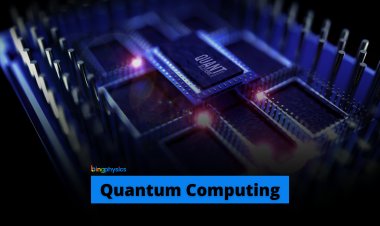The Future of Computers
There is no doubt that computer science is advancing rapidly. Every year we find new, more compact, and powerful microprocessors – the part of computers that do calculations – that allow a large amount of information to be handled faster. For example, the microprocessors of current mobile phones are more powerful than the supercomputers of the nineties.
However, there is a physical impediment to the improvement of microprocessors: difficulty in reducing the size of transistors. Transistors are like the “atoms” of a microprocessor. Today, they range in size from 7-10 nanometers (one-millionth of a millimeter in size). In the coming years, this size will be reduced to between 1 and 5 nanometers, but what if we cannot continue to reduce the size of microprocessors? Can we move beyond the physical barriers that semiconductor materials – such as silicon – and computer science offer today?

This is where quantum computing comes in, which promises to revolutionize traditional computational science and large-scale data processing. Although it was in the early 50s w50swe first heard of quantum computing, the first quantum computers were developed around 2015, ushering in a new era in computer science. Quantum computing seeks to transcend traditional computational science, creating computers that will be able to solve – in a matter of seconds – complex problems that would take millions of years for existing computers to solve.
Quantum computing is based on totally quantum physics which studies the behavior of subatomic particles. The properties of these particles are quantified. That is, they take abstract values. In current computing, we can work with two conditions, zero (0) and one (1). Quantum computing values can not only treat one condition or another, but they can also be in a linear combination, called the superposition of states. Also, these states are connected! Or, as physicists say, confused.
Existing computers store information in bits, which have a value of 0 or 1. In quantum computing, the same information will be stored in the form of Qbit or Qubit (quantum bit). These quantum bits can have not only two states (0 or 1) but also any intermediate state. Furthermore, due to confusion, change in one condition affects others. This is why quantum computing is more efficient at solving problems because every possible solution can be tested at the same time. An example would be encryption systems used today to secure communications on the Internet. This fact is based on the idea of a large number of factors. Finding these factorized numbers would require centuries of computing with existing supercomputers. However, quantum computing already has theoretical algorithms that will be able to solve this problem more quickly. Once the first quantum computer starts working, the current encryption system will no longer be an effective way to protect personal data, which will have an impact on our daily lives.

Although quantum computing is advancing rapidly, current quantum computers are simple prototypes that require a highly stable environment to function efficiently and accurately. For example, a quantum computer needs to operate at a temperature of -273º Celsius to maintain the stability of the aforementioned quantum bits. On the other hand, existing prototypes are not yet able to perform all types of existing algorithms. An algorithm describes the instructions that a computer must follow to solve a problem. For quantum computers, the instructions of the “classic” algorithm must be rewritten so that they (quantum computers) can understand this information. However, there is still a long way to go to be able to rewrite all these equivalent quantum algorithms.
Finally, we can say that a wide and complex field of research opens up. It will promise an unparalleled effect on humanity. But we must not forget that we are still far from commercial quantum computers. If these computers were to become a reality today, quantum computers would be more like the completion of existing computers to solve certain types of problems rather than an alternative to computer technology
